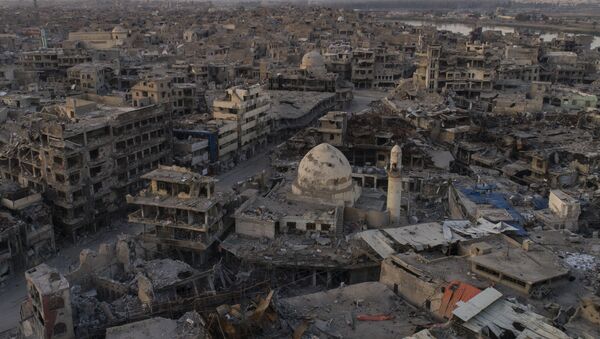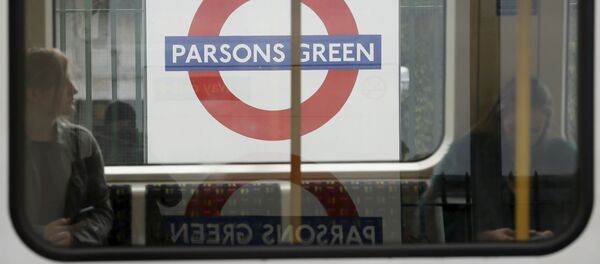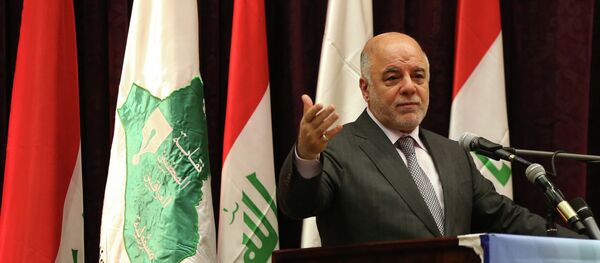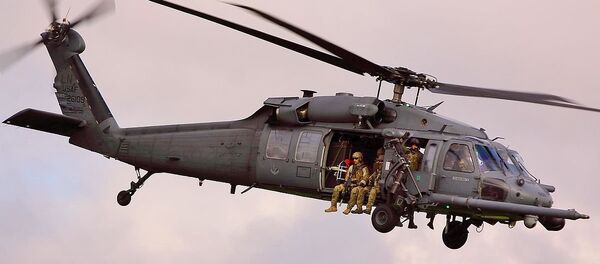On March 20, 2003, President George W. Bush announced the launch of Operation Iraqi Freedom, aimed at overthrowing longtime leader Saddam Hussein, which Washington accused of developing, storing and planning to use weapons of mass destruction. Within months, no weapons of mass destruction were found and the invasion morphed into an occupation, with the United States setting up a parliamentary-style democracy as the nation descended into a sectarian war pitting Sunni against Shia Muslims, with both targeting US forces.
A UK-based Opinion Research Business (ORB) poll estimated that up to 1 million civilians had been killed, by extrapolating from a survey showing that 20 percent of Iraqi households had lost at least one member as a result of the fighting.
Ahmed Amin, 37, an engineer now employed at a state-run manufacturing company in Baghdad, survived the initial Islamic State takeover of Anbar province and its major cities of Fallujah and Ramadi, by fleeing to Turkey, where he remained for two years. After returning to Iraq in late 2017, with Anbar liberated, his bitterness becomes obvious when asked about US involvement in his nation for the past 15 years.
"This is a frivolous question because everything in Iraq is a proof the Saddam’s rule was more stable and people enjoyed security, and this answer can be heard also from current Iraqi politicians who once supported the US invasion," Amin told Sputnik.
Ahead of parliamentary elections next month, the United States faces growing pressure to reduce its politically sensitive presence in Iraq, which the US Defense Department characterizes as a reorganization of the international coalition that supported Iraqi forces with airstrikes to retake territory ruled by the Islamic State.
"The upcoming Iraqi parliamentary elections will be merely a vote of support for incumbent Prime Minister [Haider] al-Abadi," Amin said. "Iran has the most parties on the ground that are willing to serve its agenda."
Jenna D., who asked that her last name be withheld to protect her extended family in Baghdad, Fallujah and Ramadi, fled to Jordan in 2007 and entered the United States as a refugee the following year. After gaining US citizenship, she visited Iraq in 2014, 2015, 2017 and returned to the United States this month after spending two-weeks with her immediate family in Baghdad.
"I don’t tell people I’m coming to Iraq, only my family, to limit my visibility," Jenna told Sputnik. She described pervasive corruption that was absent under Saddam Hussein’s rule.
"Everybody is asking for a bribe, a tip. Lots of friends, cousins, nephews have applied for jobs to find people demanding thousands of dollars, $10,000, up to $20,000 in return," she said.
While visiting a sick sibling in a hospital, she confronted a man in a white coat who was smoking a cigarette in a hospital hallway lined with no-smoking signs, only to be told by her brother to stop. "He might hurt you," the brother said.
Jenna described the hospital as filled with second-hand smoke. She also said the streets of Baghdad are filled with trash piled so high that some roads had become impassible.
Airport security, she added, resembled a military base with a barrier well beyond the airport that requires passengers to take taxis from the compound entrance to the main terminal building.
In February 2009, President Barack Obama announced an 18-month plan to draw down US troops to a force of 50,000 that would train Iraqi security forces and provide intelligence. But by December 2011, all US troops were gone due to pressure from the Iraqi government. By then, the country had changed, according to Mohammed Dulaimy, who grew up in Fallujah and where his family resided at the time.
"The whole mindset of the majority of society was that there were only ‘holy fighters’ and their enemies," Dulaimy explained. Criminals had simply rebranded themselves as jihadists.
When completing his studies in early 2014, the Islamic State onslaught had begun with immediate success in Fallujah, where the local population initially welcomed the Islamic State for ending persecution of Sunnis by the Shia-dominated government.
"People didn’t believe the United States when they warned about al-Qaeda, [terrorist leader Abu Musab] Zarqawi. This is what Islamic State brought to the table," he said. "Suddenly people saw their worst fears, that everything they were told might be true," he said.
Dulaimy’s family described in telephone conversations being saved at one point by Islamic State fighters, who fired on advancing Iraqi helicopters that had begun firing on refugee convoys fleeing the city. His family eventually settled in Kurdistan.
But Iraqis interviewed by Sputnik fear that renewed fighting will return to the streets of Baghdad and other cities, with Iraq's predominantly Shia military forces and allied Iranian-backed Shia militia allies battling the next incarnation of the Islamic State.
By the end of 2017, Iraqi forces backed by airstrikes from a US-led coalition had retaken nearly all Iraq territory from the Islamic State, with Iraqi politicians now pressing for a reduction of the American military presence as the April 12 date for Iraqi's election approaches. Negotiations between the United States and Iraq on a long-term US military presence are reportedly underway. Sectarian warfare in Iraq reached its most intense phase from 2004 to 2008, with US deaths topping 3,000, more than 23,000 wounded and Iraqi civilian fatalities estimated at more than 50,000.
*Terrorist organization, banned in Russia




